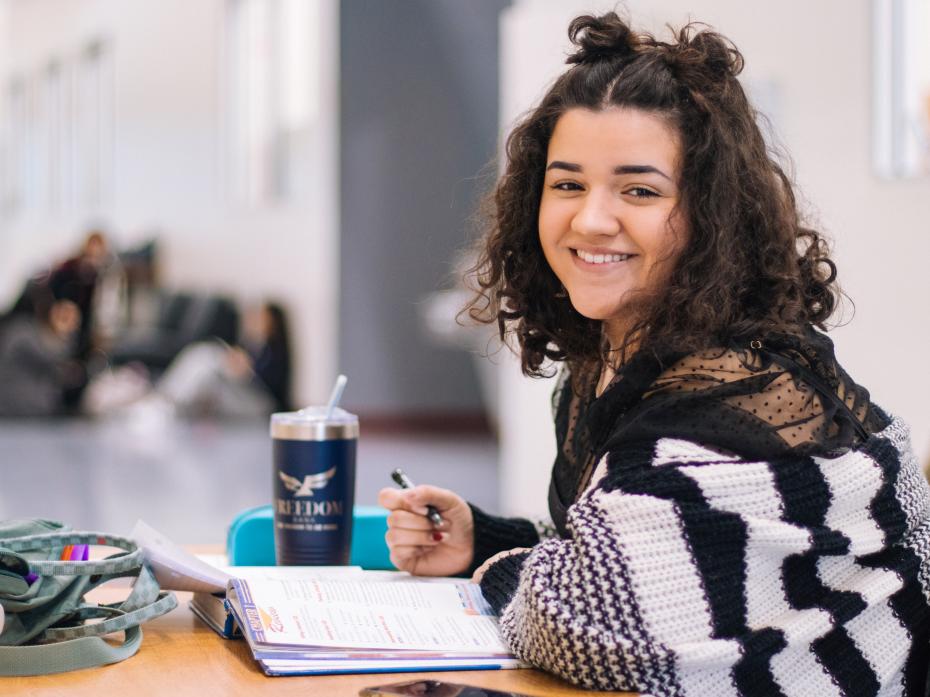
Teaching humanities from a distance

What does it mean to offer a humanistic education from a distance?
A few weeks into the pandemic, we began to think about this question. We were working on a programme to invite underserved high school students to college campuses to study humanity’s deepest questions about leading lives of purpose and civic responsibility.
Students taking part in Knowledge for Freedom programmes faced many challenges: parents out of work, summer jobs cancelled, parents in work needing help with younger siblings.
Some students had underlying health conditions and had not left their family apartments in months.
They felt lonely, disconnected and discouraged. They missed their high school graduations and proms. They missed their friends. After the initial shock of quarantine subsided, they were hit with the trauma of the police killings of Breonna Taylor and George Floyd. They were scared.
How could we offer an online educational opportunity that would be both elevating and stabilising?
Take it back to basics
We knew that whatever we did would have to be done at a distance. Yet we went back to basics, to the fundamental value of having someone who checks in, a worthy book to read and reflect upon, and an opportunity to practise the craft of writing about the world we live in and its vital relationship to the past.
The result was a three-tiered approach to learning during the pandemic that could be of service to humanities professors preparing again for teaching remotely in the months ahead:
- Remember technology is the medium, not the message
- Provide weekly one-to-one mentorship
- Guide students to read and reflect upon transformative texts, works of literature and philosophy that when placed in dialogue with one another help anchor students in a history of ideas and deepen students’ thinking about the world they encounter.
Mentoring matters
The educators in our programme – faculty as well as graduate students we deliberately call “mentors” for the term’s connection to a long-standing commitment to a student’s growth – met with individual students weekly, using every form of technology available.
They used Zoom when students had access to it or phone calls when the internet and laptops were scarce.
Students learned while sitting in front of a computer, but also while walking outside, moving around their homes and kicking up their heels on the floor.
The key purpose of the technology was to give students access to an educator who cared about them. The form of technology didn’t matter much as long as it provided a connection between student and mentor.
In weekly meetings, mentors began by getting to know the students, then worked with them on close reading of short passages, and helped them, through dialogic questions, to make connections between the text and their lives.
Mentors asked their students to consider the purpose of education, to describe how their ideas of freedom have evolved, and to imagine how they would respond to urgent ethical challenges such as masking and school closures, before and after reading books such as J. M. Coetzee’s Waiting for the Barbarians or James Baldwin’s The Fire Next Time.
The mentors became an anchor in their students’ lives, reminding them that in this time of invisibility and isolation, they and their ideas were present to their teachers.
Reading works
The students, who we call “fellows”, relished reading works of literature that demanded close attention and helped them think about their particular moment in history.
Over the summer, they moved from being passive recipients to active and informed commentators on the essential relevance of timeless concepts such as love, responsibility, vulnerability, belonging and forgiveness.
One fellow, Nick, drew upon Sophocles’ play Philoctetes to ponder the task of healing societal wounds without the help of divine intervention. Another, Ramon, connected Pericles’ funeral oration to social media posts thanking healthcare heroes.
A third, Simone, compared the enslaved mother in Toni Morrison’s Beloved to her own family, writing that “fear isn’t anything new for Black families as it is something that we are born into; our parents fear for us until we are old enough to fear for ourselves”.
Students living in quarantine found inspiration following the residents of the fictionalised Oran in Albert Camus’ The Plague. They saw themselves in Camus’ city dwellers, whose initial shock was followed by fatigue and complacency.
Humanistic learning for any medium
For centuries, human beings have learned through the act of reading and the art of mentorship and these educational assets can be adapted to any learning environment, no matter the resources.
Mentors can be replaced by classmates who check in, significant books can be chosen from all periods of history, and questions can be posed that illuminate and deepen students’ reflections on the world they confront.
Too much is being asked right now of our nation’s educators and students. In addition to not knowing what will be demanded of them, and their uncertainty about the medium in which they will be expected to teach and learn, they face the grievous loss of spontaneous human connection that bonds teacher to students, particularly in times of need.
We are all vulnerable to forces of history that determine so much of our lives. Yet this year, we have an opportunity to enlarge the education conversation beyond the initial and important question of access to technology, and to focus on the intellectual and emotional potential of humanistic learning with or without technology.
The pandemic helped us rediscover the immense value of offering a student a mentor, giving them books, and inspiring them to be a thoughtful witness and to develop a clear voice about the world they encounter. These gifts will never lose their value, not during the time of the virus and not after its departure.
Jessica Lee is the executive director of the Freedom and Citizenship programme at Columbia University’s Center for American Studies. Tamara Mann Tweel is the programme director of civic initiatives at the Teagle Foundation.
If you would like advice and insight from academics and university staff delivered direct to your inbox each week, sign up for the Campus newsletter.
Additional Links
The Freedom and Citizenship programme at Columbia University.
The Knowledge for Freedom initiative run at campuses across the US by the Teagle Foundation.


